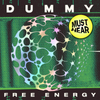Enough With the Shoegaze Revival—Dummy Are Taking It Back to Madchester
The L.A. psychedelic indie rock band surrenders to the beat on ‘Free Energy.’

In the late 1980s and early ’90s, two complementary visions for the future of rock music took shape on the British Isles. Each borrowed from the techniques and textures of the electronic dance music that was sweeping the UK in those heady Second Summer of Love days and used them to different ends. One sound is more popular than it’s ever been: shoegaze, which at its most adventurous involved using digital samplers to chop up and rearrange live drum parts and turn bursts of guitar feedback into expressions of incorporeal longing. The other isn’t quite so massively trendy, though it seems closer and closer to a full-on revival with every passing day. That is: baggy, or Madchester, or music that sounds like the Happy Mondays, or whatever you want to call it—bands that combined rave breakbeats and piano stabs with rock’n’roll songwriting and swagger, less concerned with incorporeal longing than they were with having a good time.
The L.A. indie rock band Dummy has always had a bit of shoegaze in its roaring guitar sound and coolly distanced vocals, though they’re too fidgety and curious to fit comfortably within that genre descriptor, no matter how broad it’s gotten lately. They also have a healthy dose of Stereolab, pinches of various krautrock bands, some Brian Eno, a little of the Velvet Underground, a touch of Terry Riley. One thing those reference points all have in common is their taste for drone and repetition; another is the impression they give, to varying degrees, of taking their music quite seriously, aspiring to something like the condition of high art. The Happy Mondays, on the other hand, were famous for getting extremely fucked up and offering reliable employment to the world’s least proficient maraca player. They and their laddish ilk are unexpected candidates for inclusion in Dummy’s canon of influences. And yet a solid half of the songs on Free Energy, Dummy’s fantastic second album, are propelled by the sort of herky-jerky dance rhythms that might have filled the floor at the Hacienda in its heyday.





